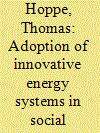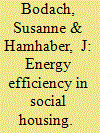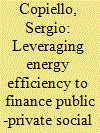| Srl | Item |
| 1 |
ID:
116997


|
|
|
|
|
| Publication |
2012.
|
| Summary/Abstract |
Thanks to new insights on the impacts that dwellings have throughout their life cycles, there has been increased attention to retrofitting innovative energy systems (IES) in existing housing. This paper uses an explorative case study design to gain more knowledge about the governance aspects of this under-researched topic. The central research question is: Which factors influence the adoption of innovative energy systems in social housing sites during renovation projects? To answer this question, eight large-scale renovation projects in The Netherlands were investigated. These case studies allowed the identification of barriers, enabling factors and perspectives from three main actors-housing associations, tenants and local authorities. It turns out that adopting IES encounters many barriers: lack of trust between project partners, delay in project progress, financial feasibility considerations, lack of support from tenants, lengthy legal permit procedures, over-ambitious project goals, poor experiences in previous projects, and IES ambitions that are not taken serious by key decision-makers. Furthermore, IES were only successfully fitted in three of the eight projects. Moreover, ambitions were lowered as the projects progressed in all the cases investigated. The study calls for further systematic, in-depth comparison of fitting IES in large-scale renovation projects in social housing.
|
|
|
|
|
|
|
|
|
|
|
|
|
|
|
|
| 2 |
ID:
101511


|
|
|
|
|
| Publication |
2010.
|
| Summary/Abstract |
This paper investigates the energy efficiency in a segment of the building sector in emerging countries by analyzing and evaluating the energy efficiency of a social housing project in Brazil. Energy efficiency measures and bioclimatic design strategies are developed in order to improve thermal comfort in this social housing project and to reduce the energy consumption and expenses of their residents. The institutional barriers and constraints toward higher efficiency are described. The results of this study show that there is a high potential to increase energy efficiency in social housing in emerging countries like Brazil. The implementation and consideration of the energy efficiency measures and policy recommendations would contribute substantially to the goal to dampen the fast growth of energy demand in these countries. Moreover the improvement of energy efficiency in the social housing sector could be a driver for market transformation towards more sustainability in the whole building sector.
Research highlights
?There is a high potential to increase energy efficiency in social housing in Brazil. ?Energy-efficient social housing would contribute substantially to dampen the fast growth of energy consumption in emerging countries like Brazil. ?Implementation of energy efficiency would improve the income situation of the poorest strata of the population.
|
|
|
|
|
|
|
|
|
|
|
|
|
|
|
|
| 3 |
ID:
166374


|
|
|
|
|
| Summary/Abstract |
Much of the social housing stock in southern Europe is obsolete in energy terms, with users who also present very specific socio-economic profiles requiring in-depth study. Proposals for this type of housing stock of current energy retrofitting policies, based on standardized user patterns, will only contribute to increasing the ‘performance gap’ between real and estimated consumption.
|
|
|
|
|
|
|
|
|
|
|
|
|
|
|
|
| 4 |
ID:
150006


|
|
|
|
|
| Summary/Abstract |
The Italian housing model relies on a high rate of privately owned houses. In comparison, few dwellings are built and managed by the public sector. The social housing stock has been built mainly during some post-second world war decades; instead, since the early nineties, it underwent a privatization process.
|
|
|
|
|
|
|
|
|
|
|
|
|
|
|
|
| 5 |
ID:
094909


|
|
|
|
|
| Publication |
2010.
|
| Summary/Abstract |
Environmental concern in light of anthropogenic climate change will impact the housing sector as one of the major energy-consuming and carbon dioxide producing sectors. For new housing, currently the most important policy to combat this issue is the Code for Sustainable Homes.
The social housing sector is under obligation to comply with these standards, which entails a significant increase in the cost of housing delivery. The sector is also under pressure to increase much-needed housebuilding, without increased funding being available. The quandary facing the sector is how to achieve both aims. Therefore any policy, such as the Code, which impacts on the ability of the sector to deliver unit numbers must be truly effective at delivering its own main aim.
This paper explores the current situation, with a preliminary analysis of how the Code may not be able to deliver its 'sustainable energy' goals due to the ways in which 'low and zero carbon technologies' are assessed and how they behave in real world situations. It demonstrates that further research and policy changes are needed to deliver sustainable energy for this sector and ensure the delivery of crucial new housing is not hampered whilst also failing to meet energy goals.
|
|
|
|
|
|
|
|
|
|
|
|
|
|
|
|